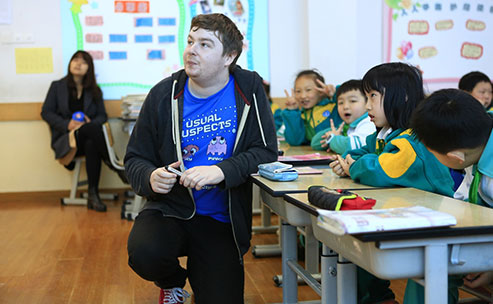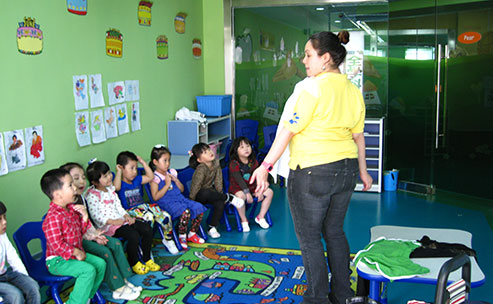What kind of visa should I get?
How do I obtain it and what do I need to know for the application?
You need a Tourist visa for attending this course. You can obtain it from your local consulate or a travel agent. You could find your local consulate’s website through Google by typing in “Consulate General of the People's Republic of China in __ (Country of Residence) __" for example. Please check your local consulate’s website for any changes in the visa policy. ITTO does not assist in any visa process.
How many students on average are in the program?
We usually have small groups of 4 to 10 students as the usual size; however, the number may go up in summer. Most of the participants are American, British, Canadian or Australian, although we do accept non-native English speakers who have a good grasp of the English language.
What are the teaching practices, students and classes like?
We offer English classes for Chinese students (all ages and levels) who are interested in improving their English language abilities. Trainees will be scheduled for observed teaching practice both on and off site depending on students’ circumstances. Class sizes range from 4 to 50. Trainees will be teaching lessons of 35 to 55 minutes according to class availability.
What is the program accommodation like, when can I check in?
We collaborate with a local hostel that's 5 minutes’ walk to our office. Dorms area available at $10 a night and single rooms start at $22. Students are welcome to arrange their own accommodation, and studios in downtown Shanghai can be found for as little as $700 a month.
What is the average salary like in China?
The average salary’s in China range greatly depending on different cities, local cost of living and how much you want to work. The average ESL salary ranges from 11,000-15,000 RMB per month in Beijing/Shanghai to 5,000-10,000 in more rural areas. If you add in overtime and part-time tutoring gigs it is possible to earn upwards up to 20,000 as a recent TEFL-graduate, although you are unlikely to have much time to spend your hard-earned cash.
Does the Chinese government block some websites?
The Chinese government has blocked many “social media" sites such as: Facebook, Pandora, YouTube, Snapchat and others. Skype works fine here, so you will not have any problem communicating with your friends and family. Apart from living on the other side of the world, you will have to adjust to different standards and apps to use. WeChat is your one-stop shop app for everything. From messaging, group chat, calling a taxi, and even translation, WeChat is by far your most useful resource while in China. Also, Google is blocked so you will become familiar with Yahoo and Bing a lot more.
Before you start bidding farewell to your Facebook friends, look into a Virtual Private Network or VPN. Recommended VPNs include Astrill and Express VPN. That being said, the “high-speed" Internet is typically pretty slow and probably not what you are used to in a western country.
How is the Mobile phone use in China?
In China there are three mobile providers, China Mobile, China Unicom, and China Telecom. China Mobile and China Unicom are GSM providers while China Telecom is a CDMA provider. You can bring your own phone as long as it is a GSM unlocked phone. Unlocked is NOT the same thing as off contract, you can call your current provider to give you an unlock code or Google for alternative methods. If you don’t bring your own phone, it is fine. You can choose a new phone just like in western countries. Popular smartphone manufacturers include Apple, Samsung, Xiaomi, HTC, and Huawei. Also, when you buy a phone, it is not billed across your monthly bill; you pay for it up front. You can get a pretty nice phone for about 2,000 RMB or less, which is about $300 USD.
If you go to a large branch of any provider there will almost always be an English speaking staff. Make sure to bring your passport with you when applying for a number or conducting any business on your account. Prepaid and contract options are both available for foreigners. There are multiple ways to pay your bill including going to a local branch, a convenience store, paying in cash, you can purchase recharge cards from newsstands or convenience stores, or add money online with your bank account.
How is Money and Banking in China?
The Chinese currency is the “Yuan Renminbi"; it is referred to as Yuan, CNY or RMB (Renminbi). It is the only currency that can be used to purchase local items. In general, the Chinese do not use checks. Cash is the most common way of payment. Online and mobile payments are becoming more and more popular including WeChat and Alipay. Alipay is very similar to PayPal but based in China. Apple Pay was recently launched in China as another mobile payment method.
You will want to open a bank account right away. This can be done very easily with only your passport and a signature. I have found Citibank to be very “foreigner" friendly. They have multi-currency accounts that allow you to receive money in your home currency, as well as in Yuan. Your employer may have a preferred bank so check with them first. It is also a good idea to check with your home bank and verify if they have any sister banks in China, this could save money on international transfers.
Before arriving, you are encouraged to open a PayPal account. Most major banks in China will allow you to link you online banking to PayPal. This will make it easier to transfer money to and from your Chinese bank account. Western Union and wire transfers are also available but the fees are a bit more expensive.
Without your pay stubs the limit on foreign money exchange for a foreigner is $500USD/day, so don’t wait until the last day if you plan to take a lot of money home with you. Another option is to also have a Chinese friend convert the money for you, they are allowed up to $50,000USD/year.
As for credit cards, MasterCard, VISA and Discover all work in the mainland. They have an arrangement with Union Pay, which is the authority for all banking in China. This means you can use your credit card in many, but not all places. Be sure to contact your banking provider ahead of time to inform them of your travels. This will prevent any issues or restrictions that can be considered fraud charges or etc.
How are the Medical Facilities?
Hospitals throughout mainland China are staffed and equipped to handle pretty much any medical requirements you may have. There are three types of medical services: Western-style hospitals and clinics which you will really only find in Tier 1 cities, regular clinics in local hospitals, and VIP clinics in local hospitals. These hospital and medical facilities will be able to provide the best care for your needs. In addition, dentists are also readily available.
For major cities a lot of dentists will have English speaking staff and cater specifically to the expat community. For example, a basic cleaning will cost 400 RMB in Shanghai.
Also, these hospitals/clinics are not authorized to provide all the vaccinations required, for which you have to go to a local government hospital. Most local hospitals also have VIP clinics, which aim to provide services to expats. About 150-300 RMB would get you a consultation with either a senior doctor accompanied by an English-speaking nurse or an English-speaking doctor. Or for a basic visit, registration fees amount to about RMB 10-20RMB.
How will I learn Chinese (mandarin)?
Most schools provide some means of learning Mandarin, either on-line programs or live classes. Independently, there are countless opportunities to learn the language. Ways to learn mandarin range from local universities, mandarin institutes, tutors, language exchanges, and more.
Where will I live?
Unless your position comes with free housing, upon arrival you will stay in a hotel for 1-3 weeks. This will give you time to work with a local Realtor (provided by either your school or by the school) and find a suitable apartment based on your schools location and how much money you want to spend.
Can I move to China with a family?
Moving to a new country with your family certainly adds additional questions and concerns. First off, is it possible? Yes, it is definitely possible. The fact of the matter is that some schools/jobs are not set up or designed to accommodate a family. Others are. Your school placement specialist will be there to help identify a school that will welcome you and your family. There are some additional items that you will be responsible for and should be prepared for: Schooling – Public or private and the cost associated with both VISA’s – Because you will be a registered “Foreign Expert" you can sponsor VISA’s for your family, but this will be at your own expense.
The first few weeks or couple months will probably be the hardest time while you are adjusting to the new environment, finding housing, schools, etc. Having someone like a spouse or friend to help with childcare during this time will be very helpful. Another suggestion is to begin learning Mandarin before you arrive; this will help make your transition easier.
What if I need prescribed medication?
Generally speaking, nearly all medications that are available in Western countries can be found in China. Nearly all of the common Western OTC (over-the-counter) drugs can be easily purchased at a Chinese pharmacy. Their distinctive green cross sign easily distinguishes pharmacies in China. This will be prominently displayed on the outside of the building and will be an indicator that a licensed pharmacist is on duty inside.
English language skills can vary quite a bit; in large cities it will be possible to find an English-speaking pharmacist or pharmacy tech, but in smaller cities this might be more of a challenge. To get around this, try writing down the technical name for the drug instead of the brand; for example, Ibuprofen instead of Advil, Acetaminophen instead of Tylenol. Most drugs will require a prescription from a Chinese licensed doctor, although there are some antibiotics available OTC that require a prescription in Western countries. In general, so long as you head to a licensed pharmacy with a prescription in hand or with a little preparation; pharmacies in China are very similar to those found in your home country.
What are the dangers of teaching in China?
The biggest danger is never wanting to leave! But of course living anywhere has its dangers and annoyances. Knowing what to look out for and what areas to avoid will always be helpful. Rather than listing specifics for all parts of China, go to the links page where we have posted links to some of the resources for teaching abroad travel safety.
What is the cost of living in China?
As a teacher you have quite a built in advantage here in China. Teachers can earn anything from $1,500 to $4,000 USD per month. There are also plenty other benefits like free housing, free meals and 1-2 months of PAID vacation. China is a huge and varied country; the highest earning individuals are in the biggest cities and of course this is where the highest expenses are.
The apartment you choose to live in will ultimately affect every part of your cost of living. If you travel by subway to work you can pay .50 cents each way for the subway. Or you can spend $2 ($2 for the first 1&1/2 miles) or more on a cab ride. Yes, Uber is available!
A basic guide for apartment costs is:
3,800 RMB: One bedroom of a larger apartment in a tier 1 city
1,000 RMB: Entire one bedroom apartment in less developed city
Other costs you will encounter:
25RMB/Hour: Housekeeper (called an Ayi)
500 RMB: Train ticket (Beijing to Shanghai)
180 RMB: 1 hour massage
2,500 RMB: Electric scooter (very popular in big cities)
500 RMB: Bicycle
10 RMB: DVD
15 RMB: Video game (PlayStation, Xbox, etc.)
1,800 RMB: In-home Internet for the year
1,600 RMB: Plane ticket (Shanghai to Bangkok, Thailand)
5 RMB: Local beer
30 RMB: Imported beer
These are just a few examples of expenses you may come across while living and teaching in China. Working with the school you are guaranteed to get a position that will pay you enough to live well, save money and pay off debts.
How will we meet new friends and other expats?
Just like any new cities, you will have to put yourself out there to meet new people. The more internationally developed cities will have more expats but no matter what city you are in, everyone is in the same boat. They're in a new place and looking to make friends, in general the expat crowd is some of the friendliest people you will ever meet. WeChat will be your go to for joining group chats related to nightly events, official accounts for promotions, and a lot more. Meetup.com and internations.com are great sites that offer a range of events and networking opportunities no matter your interests. Also, just consider your workplace. Your staff and colleague will be your first line of defense for meeting new friends.
What if I don't like it? What if I want to quit or go back home?
Most contracts will be 1 to 2 year’s standard, and it is possible that you will not like the situation. Anything from culture shock, language barrier, your students, and more can affect you longevity in China. Within each contracts, there will be a clause that states that you will need to give anywhere from 30 to 90 days’ notice of your exit. This will allow the proper procedures to be completed including resident permit, visa, and etc. You are going to be on an adventure so all the times will not be good times, but don’t give up. After day one, you will get acclimated and you will feel more comfortable by the day. If you are having difficulties with your school, get in touch with your placement consultant at the school so we can try to smooth things out either at that school or find you a more suitable placement.
How will I find an apartment?
We here at the school work hand in hand with designated realtors and agents to help provide the best services assisting you with your living hunt. In addition, your school or colleagues may have preferred agents based on experience with foreigners and expectations. The turnaround period is very quick, so you will be able to find a place within a week, just be prepared to look at a lot of places. Also, consider this is China and not your home country, so things will be a little different. Make sure you request a western toilet, unless you want to make this the most immersed experience all around. Most foreigners share apartments with each other, strangers and friends. It is a very common practice.
How can I buy tickets to travel?
Because you will be paid in RMB, you will want to buy plane or train tickets in that currency. The top online provider for travel in China is Ctrip.com. They offer an English version of their site also. It is also very common for a local to purchase the tickets for you and you pay them the cash directly because the buying ticket curve can be a bit frustrating. In addition, one of the easiest methods is to go to the airport or train station and speak with someone at the English speaking counter. Just be sure to bring your passport and enough money. They’ll accept local debit/credit cards as well as international cards i.e. Visa or MasterCard.
Where will I buy food?
The two major grocery store chains are Carrefour and Tesco. Think of them as Wal-Mart plus a dash of target. These chains will have almost everything you need from clothing, electronics, groceries, toiletries, and everything in between. The imported food will be limited and often rather pricey. There are plenty of local grocery stores and fruit markets located in every city. Most labels will include a Chinese and English translation for general staples.
Online grocers are becoming very popular and are often the best sources for imported food (fresh or frozen) as well as alcohol.
What are ESL, EFL, TEFL, TEFL-C, TESOL and TOEFL ?
English as a Second Language (ESL) differs from EFL, in that ESL implies the teaching and learning of English in an English-speaking region (e.g., the US), while EFL more commonly applies in non-English speaking regions. EFL and ESL involve different challenges and strategies for teachers and learners alike.
Teaching English to Speakers of Other Languages (TESOL) and Teaching English as a Foreign Language (TEFL) are often used as interchangeable terms. While they differ slightly from one another, both are established, internationally recognized standards for methodology and practice to teach English language skills to non-native-English speakers. TESOL certification is widely regarded as a rigorous standard for teachers, and requires prescribed curriculum, and a minimum six hours of supervised practice teaching in an actual student-classroom environment. A TESOL certificate is widely recognized by EFL teaching schools and programs as the mark of a well-trained, highly qualified EFL teacher.
On the student side, the Test of English as a Foreign Language (TOEFL) is a widely recognized test of proficiency in the English language. At most USA and U.K. colleges and universities, a verifiable passing mark on the TOEFL exam is a requirement to matriculate for all students from non-English-speaking countries.
Do I need to speak another language?
No, as a matter of fact the schools do not want you to speak Chinese in the classroom. In many cases you will work with a local Chinese teacher in the classroom that can translate if needed. Assuming you would like to learn Mandarin Chinese, you have a multitude of options at your disposal, everything from on-line software, private tutors, to group intensive classes.
What will my travel expenses be?
First you will need to pay the processing fees for your Chinense Visa. Then your 2 main expenses will be airfare and hotel stay upon arrival. All of the teaching jobs we offer provide some form of compensation for these 2 expenses. In some cases the school will pay for them upfront. In other cases you will need to pay and the school will reimburse you. Your recruiter will be able to tell you the specific compensation provided by specific schools.
Do I need a teaching certification or experience?
At this time all of the teaching positions we are offering require either 1 year of teaching experience or an internationally recognized TEFL/TESOL/CELTA certification. Satisfying either of these requirements will qualify you for a teaching position in China. Candidates with both experience and certification stand to benefit from the highest paying positions.
Do I need a university degree?
Teaching positions in China will require proof of completion of a Bachelor's degree or above.
What type of Teacher Jobs and Teaching Jobs Vacancies will I get?
Private English language training center for kids or adults:
These schools are attended by kids or adults on the evenings and weekends, specifically for English language instruction. This is the fastest growing segment of education in China. Classes are held year round with the majority of vacation time based around Chinese holidays. Because of the rapid growth in this segment many of these schools provide potential for career advancement.
Preschools/kindergartens:
The name says it all; the children are 18 months to 6 years old. You will be helping them become familiar and comfortable with the English language. Schedule is daytime weekday hours. Preschools hold classes’ year round while kindergartens work on the traditional 2 semester schedule with winter and summer breaks. Foreign language primary, middle or high school: These are traditional schools for all grades. Some subjects are taught by foreign teachers in English, while others are taught by local teachers in Chinese. Classes are held on the traditional 2 semester schedule with breaks in the winter and summer.
International School:
These schools are where the professional expats and wealthy locals send their children. Tuition is expensive and the level of education is top notch. Classes are held on the traditional 2 semester schedule and almost all classes are taught in English. Teacher qualifications are toughest in this category but the remuneration is fantastic. These schools often require a 2 year commitment.
University:
These positions vary greatly. There are jobs for entry level teachers instructing basic oral English up to Doctorate level professors. Classes are held on the traditional 2 semester schedule.
What are the best teaching jobs in China?
The answer to this question really depends on what you are trying to accomplish while you are here. Are you looking for experience to help build a teaching career? Is money a big concern? Do you want as much time to travel as possible? By explaining your goals/plans to your school recruiter, he/she will be able to help find the best teaching job for you.
How much will I get paid?
Salaries and bonuses will vary greatly by region and by the type of school. Some parts of China have considerably higher cost of living than others. Full time teaching work on average will pay between CNY 6,200 - 40,000/month. Keep in mind that with the cost of living in China in most cases this money will allow you your own apartment, housekeeper, discretionary spending (eating out, etc.) and you will still be able to save money each month! Compensation can also include a starting bonus, free airfare, housing stipend and contract completion bonus.
How do I write my teaching abroad resume/CV?
Your resume or CV (Curriculum Vitae) will probably follow a similar outline to what is used in your home country but there are some things you can add to make it stand out from the crowd.
Basic information:
You probably wouldn’t have this information on a CV in your home country but work VISA regulations have rules on age and nationality so you will want to add that.
Always include a photo. A passport style “headshot" is perfect. The schools want to know what you like and after you are hired this photo will be submitted with your other documents to secure your work VISA.
Additional suggestions:
When listing work experience there is no need to write a paragraph about each job. A basic explanation along with some bullet points is perfect. Be sure to clearly list the dates of employment and if you really want to stand out, add the name and contact information to a reference at the company!
Can I teach in China without a degree?
Teaching positions in many provinces in China will require proof of completion of a Bachelor's degree or above. That being said, some teaching positions either because of the scope of work or location do not require a college degree. While not having a degree will somewhat limit your options, we do have positions that will allow you to work legally in China without a degree.
What about my Work VISA/Residence permit/Foreign Expert Certificate?
To work in China as a legal English teacher, your school will need to assist you in obtaining a “Residence permit" and a “Foreign Expert Certification/Work permit" from the Chinese government. Only legal, licensed schools can actually hire foreigners. By working with the school you can rest assured that your new job will be with one of these legal schools.
The process works like this: Once you have signed and submitted your teaching contract, your school will request your “alien work permit" from the Chinese government. This document along with their “invitation letter" will be sent directly to you. Once received, you will need to submit this paperwork along with your passport and visa application either directly to the Chinese embassy in your home country or to a VISA agent like VISA HQ (the agent recommended by the school). There will be a fee to pay which varies by country. Depending on processing time, in a few days or a week you will get your passport back in mail with a temporary “Z visa" inside. This temporary VISA is good for 30 days and is designed for you to enter China.
Once you are in China your school will assist you in converting this temporary VISA into a “Foreign Expert Certification/Work permit" and a “Residence permit". This process could take 2 -6 weeks during which you will not have your passport. We do suggest you make a copy of it before it is out of your possession. The government also requires you to have a physical exam done. It is pretty basic and is usually completed in China, in some cases, your school may send you a medical exam form that you can use to have the exam completed in your home country. Hopefully that clarifies the VISA situation for you!


 ITTO School's Map
ITTO School's Map MEXICO
MEXICO Guadalajara
Guadalajara Puerto Vallarta
Puerto Vallarta Chiapas
Chiapas Playa del Carmen
Playa del Carmen ARGENTINA
ARGENTINA Buenos Aires
Buenos Aires ITALY
ITALY Florence
Florence CANADA
CANADA Toronto
Toronto Vancouver
Vancouver CHINA
CHINA Shanghai
Shanghai COSTA RICA
COSTA RICA Manuel Antonio
Manuel Antonio Playa Samara
Playa Samara CZECH REPUBLIC
CZECH REPUBLIC Prague
Prague FRANCE
FRANCE Toulouse
Toulouse GUATEMALA
GUATEMALA Antigua
Antigua PERU
PERU Cusco
Cusco SPAIN
SPAIN Barcelona
Barcelona Madrid
Madrid THAILAND
THAILAND Chiang Mai
Chiang Mai USA
USA New York
New York Chicago
Chicago Miami
Miami Online TEFL Programs
Online TEFL Programs Compare Course Features
Compare Course Features




























